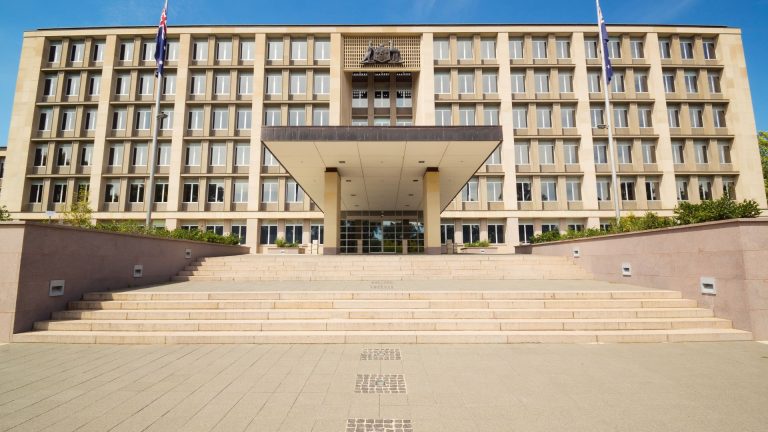Bob Katter, Rob Oakeshott and Tony Windsor have a huge task ahead of them over the next few days – a burden made heavier by the poor level of secretarial support successive government have provided. So we thought we could lighten their load by drafting a template letter to send to the two contenders:
Dear Julia/Tony
Thank you for your interest. I’m sorry it’s taken you three years to find my E-mail and phone number, but I’m always happy to talk to you.
We have some specific interests including broadband, water policy, the distribution of health resources and policies to deal with climate change – an issue which we are sorry to see has been pushed aside by both parties. While a warmer climate might extend the outdoor dining season for café-latte socialists and may be dismissed by those who think it is “crap”, it is already of vital concern to everyone in rural Australia, and will become of concern to all when they find storms dumping dust in their suburban back yards and when they find their food prices rise to the point of causing hardship. But these negotiations we can defer for a few days. Seeing you made so few [letter to Julia] any [letter to Tony] meaningful policy proposals during the campaign, we are confident that you have plenty of policy flexibility.
Right now, our interests are in governance. We demand some basic reforms to ensure that future elections present clear policy options. Something less patronizing than “stop the boats/debt/waste/big new taxes” and with a little more content than meaningless talk about “moving forward” and “working families”. Even though successive governments, state and federal, have misdirected education funding to the detriment of our regions, our voters retain the native intelligence to detect bullshit.
The principles behind these demands are to distribute power back to Parliament, which represents all Australians, and away from Executive Government, which the election results show represents only 39 to 44 percent of Australians. We are fed up with the instability of “winner take all” politics.
First, we want campaign financing reform, to prohibit all corporate donations to political parties – including union donations. That’s not going to go down well in Sussex Street or in the Collins Street boardrooms, but we cling to the old fashioned belief that politics is about people, not corporations.
Second, we want a dramatic cut in ministerial staff levels. Ministers, helpless and unworldly creatures that they are, need secretarial and administrative support, but they should rely on the public service for policy advice. Bob Katter can easily find jobs for former staffers on banana plantations, and is happy to offer some training so they can tell the difference between a banana, a lemon and a cane toad.
Third, we insist on parliamentary reform, including an independent speaker (if you offer that to us as a sinecure it proves you have learned nothing in the last six weeks), respect for private members’ bills, and a reform of Question Time.
Fourth, we want all contact between ministers and lobbyists to be recorded on a public website, with an outline of the proceedings of those contacts. Those outlines should be prepared by a public servant present at the meetings. (Please keep the website in plain text until we get something better than dialup.) Again, we acknowledge that this may result in unemployment, but we have a labour shortage up here, and could offer former lobbyists the novelty of productive work.
Fifth, we want all policy research and advice, with minimal restrictions for national security purposes, to be made public. Policy advice should be the work of agencies working at arms’ length from government; the Productivity Commission and the Reserve Bank provide sound models.
Sixth, an essential agency in this regard is Treasury. We want to see all serious policy proposals, emanating from government, opposition or other members, made subject to publicly available benefit-cost analysis in good time before any election. We accept that in many cases it will be difficult for researchers to identify all costs and benefits, but that is no excuse for failing to present whatever analysis is available. This would replace the much abused “Costing of election commitments”, which, with its narrow reliance on fiscal costs, has distorted the public’s understanding of economic management, and is hindering our capacity to make nation-building public investments.
We look forward to meeting with you. Bob Katter has offered his office as a venue, but we realize that since airlines have been deregulated it’s prohibitively expensive to get to Innisfail or Mount Isa at short notice. But we can meet in Tony Windsor’s office in Armidale or in Rob Oakeshott’s office in Port Macquarie. We urge you to drive up along the New England or Pacific “Highways” so you can experience the costs of years of diversion to middle class welfare the public revenues that should have gone to infrastructure. We pray [Tony] wish [Julia] for your safety. We won’t have room in the conference room for any ministerial staffers, but we can provide them with a bed at the local YMCA, a KFC voucher, and some coins to operate the public telephone outside the pub that Jack McEwen got for us in the 1969 election. My secretary can show them how to operate a rotary dial phone.
Yours truly,
Ian McAuley
 More Than Luck is a collection of ideas for citizens who want real change edited by Mark Davis and CPD Executive Director Miriam Lyons. A to-do list for politicians looking to base public policies on the kind of future Australians really want, More Than Luck shows what’s needed to share this country’s good luck amongst all Australians – now and in the future. Click here to find out more. Like what you’ve read? Donate to help make good ideas matter.
More Than Luck is a collection of ideas for citizens who want real change edited by Mark Davis and CPD Executive Director Miriam Lyons. A to-do list for politicians looking to base public policies on the kind of future Australians really want, More Than Luck shows what’s needed to share this country’s good luck amongst all Australians – now and in the future. Click here to find out more. Like what you’ve read? Donate to help make good ideas matter.


